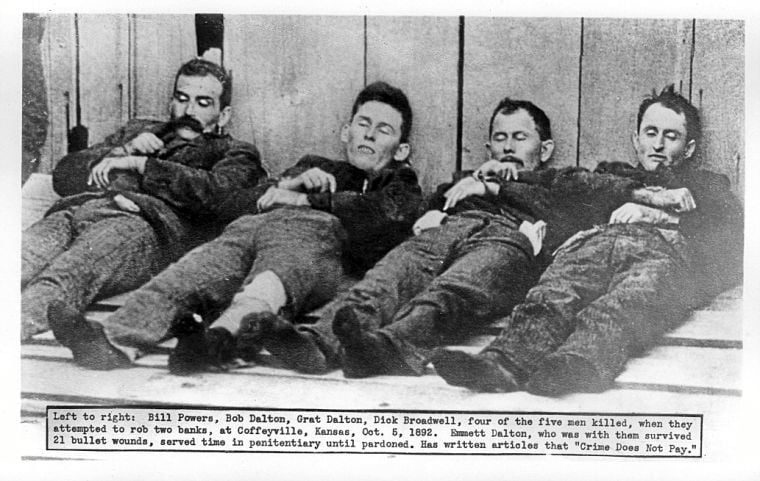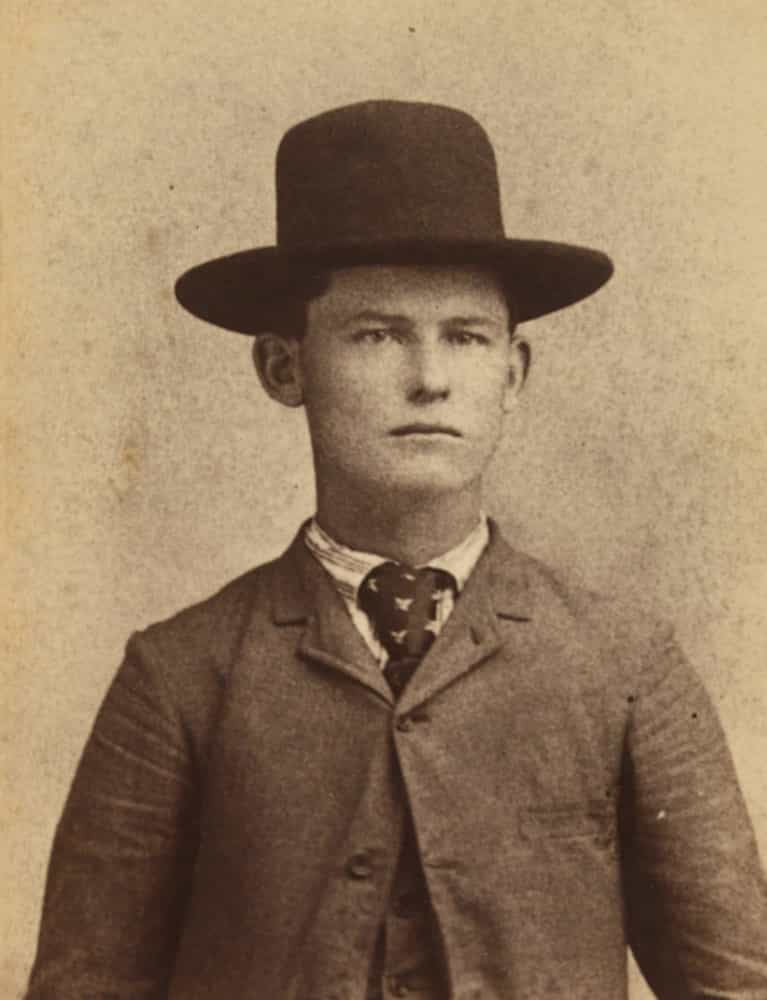Richard Broadwell: The Forgotten Man in the Dalton Gang’s Last Stand
October 5, 1892. Coffeyville, Kansas. A crisp autumn morning that would descend into a bloody, chaotic spectacle forever etched in the annals of the American Wild West. It was on this day that the infamous Dalton Gang, led by the audacious Bob Dalton, attempted an unprecedented feat: to rob two banks simultaneously in broad daylight. Their audacious gamble, fueled by a blend of desperation and overconfidence, ended not in glory or riches, but in a hail of gunfire that decimated their ranks and cemented their legend as one of the West’s most spectacular failures.
Amidst the carnage, four outlaws lay dead, their dreams of a final, lucrative score shattered on the dusty streets of Coffeyville. Bob and Grat Dalton, the notorious brothers, were among them. So too was Bill Power, a relatively recent recruit. And then there was Richard Broadwell, a figure often overshadowed by the more famous Daltons, yet a critical part of the ill-fated five-man team that rode into destiny that day. Broadwell’s story is a poignant footnote in the larger narrative of the Dalton Gang, a reminder of the countless lesser figures whose lives were swept up and ultimately extinguished by the violent currents of the untamed frontier.
To understand Broadwell’s place in this bloody drama, one must first grasp the context of the Dalton Gang itself. The Dalton name was synonymous with a certain kind of frontier ambition, albeit one that twisted from the path of law enforcement to outright banditry. Brothers Bob, Grat, and Emmett, along with their older siblings, were cousins to the notorious Younger brothers, who rode with Jesse James. This familial connection to outlawry, combined with the harsh realities of frontier life, perhaps laid the groundwork for their eventual descent into crime.

Initially, the Dalton brothers served as deputies in the Indian Territory (present-day Oklahoma). They knew the land, its inhabitants, and the ways of law enforcement. However, the lure of easy money, or perhaps a streak of inherent rebellion, proved too strong. Their stints as deputies, often underpaid and thankless, perhaps fueled a resentment. The proximity to their outlaw cousins, the Younger brothers, may also have whispered temptations of a different kind of glory, one found on the wrong side of the law. Their early crimes – horse theft, cattle rustling, and minor train robberies – were a testing ground, each successful heist emboldening them further, solidifying their path away from honest work and into the increasingly lucrative, yet perilous, world of professional banditry.
By the early 1890s, the Dalton Gang had solidified its reputation as one of the most feared outfits in the West. Their modus operandi often involved daring train robberies, striking with brutal efficiency and then melting back into the vastness of the Indian Territory. The Southern Pacific express, the Missouri-Kansas-Texas, the Santa Fe – all fell prey to the Daltons’ brazen assaults. Their numbers fluctuated, but the core leadership of Bob and Grat remained constant, their notoriety growing with each successful raid.
It was into this volatile world that Richard Broadwell stepped. Hailing from the Indian Territory, Broadwell was no stranger to the rough-and-tumble life of the frontier. Historical records about Broadwell are sparse, a common fate for those on the periphery of more celebrated outlaws. He is often described as a capable horseman and a decent shot, qualities essential for survival in the outlaw life. Some accounts suggest he had a prior record, perhaps for horse theft, which would have made him a natural fit for a gang constantly on the run.
Broadwell joined the Daltons sometime after the death of Charlie Bryant, another gang member, who was killed while attempting to escape from lawmen in August 1891. His inclusion speaks to the Daltons’ constant need for reliable, fearless hands, as well as Broadwell’s own willingness to embrace a life of crime. He was drawn into the orbit of the Daltons, perhaps by the promise of wealth, the thrill of rebellion, or simply a lack of other opportunities. For men like Broadwell, the line between desperate living and outright outlawry was often thin and easily crossed.
By 1892, the gang was at a crossroads. Despite their successes, law enforcement, particularly the relentless Pinkerton Detective Agency, was closing in. The era of the unfettered outlaw was slowly but surely drawing to a close, with telegraphs, more organized posses, and better communication making it increasingly difficult for bandits to operate with impunity. Facing mounting pressure and perhaps feeling the weight of their growing infamy, Bob Dalton, the gang’s charismatic and ruthless leader, concocted a plan that he believed would secure their legend and their fortune forever.
The plan was audacious, even by outlaw standards: to rob two banks simultaneously in Coffeyville, Kansas. The choice of Coffeyville was not random. It was a town Bob and Grat knew well, having lived there and even served as lawmen in the vicinity. This familiarity, however, would prove to be a fatal flaw. Bob Dalton, fueled by an almost suicidal overconfidence, allegedly boasted of pulling off a feat that would eclipse even the legendary James-Younger Gang. He envisioned a quick, clean strike that would leave them rich and untouchable. The reality would be catastrophic.
On that fateful October morning, the five outlaws – Bob, Grat, and Emmett Dalton, along with Richard Broadwell and Bill Power – rode into Coffeyville. Their attempt at disguise, reportedly false beards, was flimsy at best. Their horses, tied in an alley, were recognized by a local liveryman, who quickly raised the alarm. The delay inside the banks – the tellers at C.M. Condon & Co. Bank and the First National Bank feigning ignorance of how to open the safes – gave the townsfolk precious minutes.
Armed with whatever they could find – shotguns, rifles, revolvers – the citizens of Coffeyville transformed from ordinary shopkeepers into a formidable militia. The plan, so meticulously conceived in the minds of the Daltons, began to unravel with terrifying speed.

Broadwell, along with Bill Power, was tasked with robbing the First National Bank. Bob and Grat Dalton, with Emmett, went for C.M. Condon & Co. Bank. As the alarm sounded and gunfire erupted, the scene devolved into a chaotic, bloody street fight. The Daltons, caught completely off guard by the organized resistance, found themselves trapped in a deadly crossfire.
Broadwell, caught in the inferno, fought valiantly but ultimately futilely. Accounts vary slightly on his exact demise, but the outcome was the same. He was reportedly shot down near his horse, perhaps trying to make a desperate escape, or simply overwhelmed by the sheer volume of lead flying. Some witnesses claimed he was one of the first to fall, hit multiple times by the armed citizens defending their town. His body, riddled with bullets, lay alongside those of his comrades and the brave townsmen who had risen to the challenge.
When the smoke cleared, the street of Coffeyville was a grim tableau of death. Four outlaws – Bob and Grat Dalton, Bill Power, and Richard Broadwell – lay dead. Four brave citizens – Marshal Charles T. Connelly, City Attorney Lucius M. Baldwin, George B. Cubine, and Charles G. Brown – had also paid the ultimate price, sacrificing their lives to protect their community.
Emmett Dalton, miraculously, survived, albeit with 23 bullet wounds, a testament to his sheer will or perhaps a twist of cruel fate. His subsequent life, including years in prison, an eventual pardon, a memoir ("When the Daltons Rode"), and even a brief stint in Hollywood, would further cement the Dalton legend, even as Broadwell faded into obscurity.
The Coffeyville raid stands as a stark, bloody punctuation mark in the history of the American Wild West. It was an era rapidly drawing to a close, where the line between lawman and outlaw often blurred, and a quick draw could mean the difference between life and death. The Daltons, in their desperate attempt to secure legendary status and vast wealth, instead found only oblivion.
Richard Broadwell, the man who rode with them into that inferno, remains largely a footnote. His motivations – whether desperate need, a thirst for adventure, or simply misguided loyalty – are lost to time. His story, though less detailed than those of the Dalton brothers, serves as a poignant reminder of the countless lesser figures whose lives were swept up and ultimately extinguished by the violent currents of the untamed frontier. He was one more casualty in a landscape littered with shattered dreams and fatal ambitions, a ghost in the long, shadowed history of the Wild West. His name, etched only briefly into the historical record, echoes the finality of a life lived and lost on the wrong side of the law, a silent testament to the brutal realities of a bygone era.



